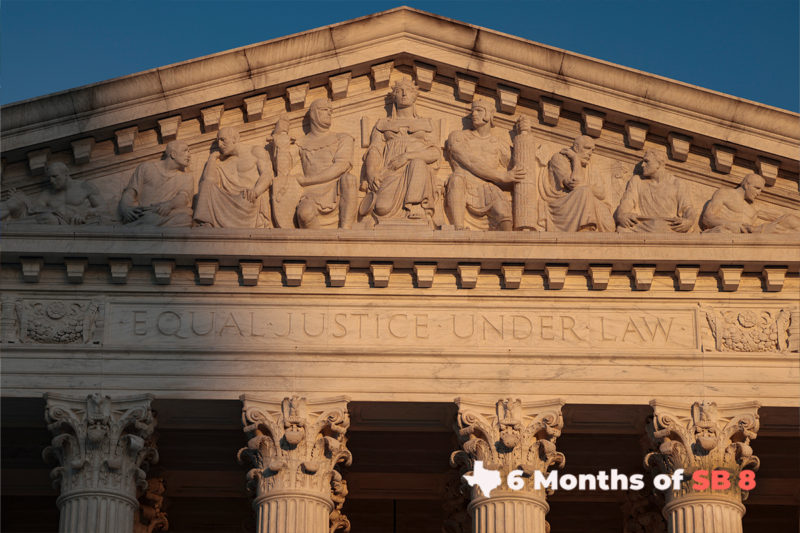The Supreme Court’s Texas-Style Constitutional Crisis
Texas SB 8 proves how the Constitution is unraveling in real time—all thanks to the Supreme Court.

For more exclusive content on the state of the abortion rights fight, subscribe to The Fallout.
We are in a constitutional crisis—and there is no end in sight.
March 1 marks six months since Texas SB 8 went into effect. The law, which bans abortion as soon as fetal heart tones are detected and offshores enforcement to third parties via a bounty system reminiscent of the Fugitive Slave Act, is egregiously unconstitutional. It doesn’t matter. The Supreme Court let it take effect anyway.
For the last six months, the constitutional promise of reproductive autonomy has been reduced to a pinky swear. Texans in need of abortion care might as well add “cast dandelion wishes” to the list of hoops they must jump through in hopes of accessing their constitutionally protected right to health care in their own state.
Next Tuesday, it’ll be 180 days and counting that abortion providers in Texas have had to face the unsustainable reality that they’re more likely to provide abortion care out of state than in—all with a bounty on their heads.
All of this is unfolding without the Supreme Court reversing Roe v. Wade and Planned Parenthood v. Casey and the central holdings in those cases, which is that states can’t ban abortion before fetal viability. (That will happen later this year when the Court releases its decision in Dobbs v. Jackson Women’s Health Organization, the case challenging Mississippi’s 15-week abortion ban.) All of this is also unfolding while abortion patients and providers are stripped of their full opportunities to have their legitimate legal claims considered in good faith by the federal courts. It remains to be seen whether they will ever get that opportunity back.
Our Constitution is unraveling in real time.
If these last six months have radically altered the landscape of abortion rights and access, the next six could permanently rewrite that map for generations. Every day SB 8 remains in effect threatens an abortion-care system already strained beyond capacity. Every day the law stays on the books, more people are unsure of what their rights even are. And the longer courts allow SB 8 to be enforced, the greater the ability of conservatives to claim its legitimacy.
In fact, they’re already doing just that.
While anti-choice advocates are hard at work peddling their messaging in the media that conservatives are actually compromising on abortion when they enact 15-week bans, conservative state lawmakers are testing the waters back home with their own SB 8 copycat bans to see just if and how they can get these measures teed up for rapid enactment. And let’s be very clear here: While federal judges in the lower courts are delaying decisions that would block other blatantly unconstitutional abortion bans until the Supreme Court rules in Dobbs v. Jackson, there’s an entire army of Federalist Society clerks sussing out the legal theory their bosses will argue to the Court to let SB 8 stand on its merits.
All the while Jonathan Mitchell, the architect of SB 8’s private-enforcement mechanism, has argued that the same enforcement mechanism that empowers total strangers to act as abortion ban vigilantes could be replicated to laws banning child labor or to enforce voter suppression laws.
So when I tell you they won’t stop with abortion, that conservative lawmakers are, in fact, using abortion as a power grab for a whole host of rights, you don’t have to take my word for it. You can take theirs.
For more coverage of six months of Texas SB 8, check out our special report.

